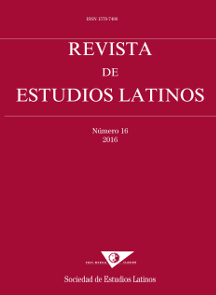Phaedrus, the protagonist of his own fables
DOI:
https://doi.org/10.23808/rel.v16i0.87682Keywords:
Phaedrus and other collections of fables; autobiographical features; literary personality; neoteric literature.Abstract
In some passages of his work, especially in the prologues and epilogues of his books, but also in several of his fables, Phaedrus casts light on some aspects of his personality and lets us know about his literary objectives. These aspects are sometimes intertwined with references to personal interests of the writer’s and to the world in which he lived.
In addition to providing interesting information about Phaedrus, these autobiographical passages tinge his work with a lyrical tone that is alien to the eminently narrative style of the fable. In no other collection of fables, whether classical or medieval, do we find this kind of personal references, which are, however, commonly found in Roman poets before and during this period.
Downloads
References
Bádenas, P. - López Facal, J. (1978): Fábulas de Esopo. Vida de Esopo. Fábulas de Babrio, Madrid, Gredos.
Bajoni, M. G. (1997): «Un esempio di autoapologia in Phaedrus, III, 1», AC 66, 289-291.
Bernardi Perini, G. (1992): «Cui reddidi iampridem quicquid debui: il debito di Fedro con Esopo secondo Fedro», La storia, la letteratura e l’arte a Roma: da Tiberio a Domiziano, Mantova, Accademia Nazionale Virgiliana, 43-59.
Bisanti, A. (1987): «Fortuna de un epimythion fedriano nella favolistica mediolatina», Pan 8, 105-119.
Blänsdorf, J. (2000): «Lecture pédagogique-morale-politique?: problèmes herméneutiques des fables de Phèdre», REL 78, 118-138.
Brenot, A. (1961): Phèdre. Fables, Paris, Les belles Lettres.
Cascón, A. (2005): Fedro, Fábulas. Aviano, Fábulas. Fábulas de Rómulo, Madrid, Gredos.
Cupaiuolo, F. (1978): Itinerario della poesia latina nel I sècolo dell’ Impero, Napoli, Società editrice napoletana.
Chaparro, C. (1986): «Aportación a la estética de la fábula greco-latina: La breuitas fedriana», Emerita 54, 123-150.
Della Corte, F. (1939): «Phaedriana», RFIC 17, 136-144.
Gärtner, U. (2011): «Palam muttire plebeio piaculum est: die Fabel des Phaedrus als literarische Kommunikationsform in der frühen Kiserzeit», en Haltenhoff, A.; Heil, A.; Mutschler, F. (eds.), Romische Werte und römische literature im frühen Prinzipat, Berlín-Nueva York, de Gruyter, 253-277.
Gaudemet, J. (1967): Institutions de l’ Antiquité, Paris, Sirey.
Glautier, P. (2009): «Phaedrus, Callimachus and the “recusatio” to success», ClAnt 28 (2), 248-278.
Guaglianone, A. (1948): «Il codex Perottinus (Nap. 4 F 54) », GIF 1, 125-128 y 243-249.
Hausrath, A. (1936): «Zur Arbeitsweise des Phaedrus», Hermes 71, 70-103.
Herrmann, L. (1950): Phèdre et ses fables, Leiden. E.J. Brill.
Lamberti, G. (1980): «La poetica del “lusus” in Fedro», RIL 114, 95-115.
La Penna, A.-Richelmy, A. (1974): Fedro. Favole, Milano. Einaudi.
Lorenzi, A. (1955): Fedro, Firenze, La nuova Italia.
Maiuri, A. (1956): «Fedro a Miseno», PP 11, 32-37.
Mandruzzatto, E. (1979): Fedro. Favole, Milano, Rizzoli.
Mañas, M. (1998): Fedro/Aviano. Fábulas, Madrid, Akal.
Marchesi, C. (1923): Fedro e la favola latina, Firenze, Vallechi.
Mattiaci, S. (2014): «Il liberto “greco” in cerca di un’identità romana: autorappresentazione e programa letterario in Fedro», en Mordeglia, C. (ed.) Lupus in fabula: Fedro e la favola latina tra antichità e Medioevo: studi offerti a Ferruccio Bertini, Bologna, Pàtron, 49-71.
Mordeglia, C. (2010): «Dalla favola al proverbio, dal proverbio alla favola: genesi e fortuna dell elemento gnomico fedriano», PhilolAnt 3, 207-230.
Noejgaard, M. (1964): La fable antique I: la fable grecque avant Phèdre, Koibenhaun, Buskc.
Noejgaard, M. (1967): La fable antique II: les grands fabulistes, Koibenhaun, Buskc.
Noejgaard, M. (1981): «La moralisation de la fable d’ Ésope a Romulus», Entretiens sur l’antiquitè classique. Vandoeuvres, Fondation Hart, 225-251.
Rodríguez Adrados, F. (1979): Historia de la fábula greco-latina I, Madrid, Editorial de la Universidad Complutense.
Rodríguez Adrados, F. (1983): «Fedro y sus fuentes», Bivium: Homenaje a Manuel Cecilio Díaz y Díaz, Madrid, Gredos, 251-274.
Rostagni, A. (1964): Storia della letteratura latina, Turín, Unione tipográficoeditrice Torinese.
Santana, G. (2004): La fábula en Aviano, Las Palmas de Gran Canaria, Publicaciones de la Universidad de las Palmas de Gran Canaria.
Downloads
Published
How to Cite
Issue
Section
License
Copyright (c) 2016 Revista de Estudios Latinos

This work is licensed under a Creative Commons Attribution-NonCommercial-NoDerivatives 4.0 International License.
The originals published in the printed and electronic editions of this journal are the property of the Revista de Estudios Latinos and can be circulated as long as the original source and authorship is made clear in any reproduction, full or partial, of the same, and as long as this is not done for commercial purposes.






